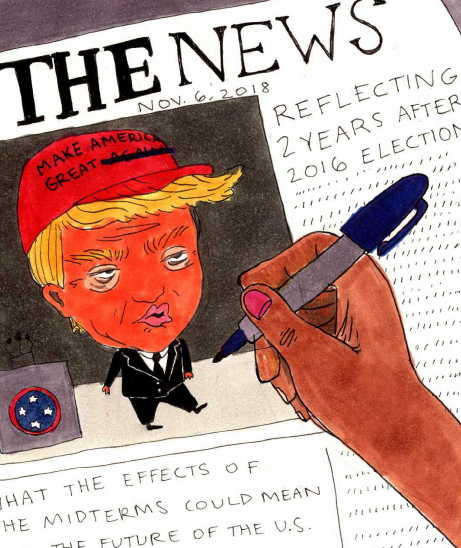The good, the bad, and the ugly: where does America lie?
November 12, 2018
As 2018 ends as the year of human rights violations and hate crimes, it would seem that the land of milk and honey has soured. However, had it ever been so sweet in the first place? The answer may not be so simple.
America has a notoriously nasty track record of injustice and oppression, yet many Americans still maintain a strong belief in American greatness, proudly citing the phrase “life, liberty and the pursuit of happiness” as if it wasn’t first spoken by a slave owner.
Every two years, when midterm elections roll around, mentions of the greatness of America return like perennial blooms. In fact, in the 2018 midterm election campaigning, the degree to which a candidate believes in American greatness was mentioned more frequently than the actual candidate’s name.
However, the midterm elections are not singular in their strategic mention of American greatness; presidential election candidates also rely on this patriotic rhetoric as a means of gaining more votes. Most notably, President Donald J. Trump’s 2016 presidential campaign ran on the hotly contested ‘Make America Great Again’ slogan and continued to do so into his presidency. However, it is not the reference to America greatness that made the slogan a source of controversy, rather, it is the inclusion of the word ‘again’.
The word ‘again’ eludes to a past period of America greatness, but there’s just one slight problem with this: there has never been a past period of American greatness.
While there is not one definition of American greatness, I can tell you what greatness does not mean: greatness does not signify the return of white supremacy, institutionalized oppression, and government-mandated exploitation. It does not encompass the normalization of hatred that Trump and his cabinet of Klansmen are fighting for in the MAGA slogan.
Over the course of several days last week, mail bombs were sent to known Democrats and Trump critics, to which the right-wing terrorist, whose social media was filled with hate-filled messages towards Democrats and minorities, was arrested on Friday.
On Wednesday, a white man with a long history of violence shot and murdered two elderly black people in a Kentucky Kroger grocery store who were buying a poster board for their 12-year old grandson’s school project, but only after he failed to attack a black church.
On Saturday, a man screamed anti-Semitic slurs while he opened fire on a Pittsburgh synagogue, killing 11 people and injuring six, some of whom were Holocaust survivors.
While some argue that all of these abominable acts have the sole theme of hate in common, I argue that they also have the common theme of achieving American greatness. When you have a president, who has an immense amount of power and authority, preaching about making American great again, it should come as no surprise that a few fanatics are turning this rhetoric into action.
Amidst the tragedy and injustice of the past week, there have been many calls for a solution to this growing problem. Many are calling for a voting revolution. While voting can be effective, it would be unfair to describe it as the sole solution to the hatred in this country. Especially in states like North Dakota and Georgia, where the voices of indigenous and black citizens are being silenced through 60’s-era voter suppression tactics, voting is not an accessible solution for all everyone.
In a nation where a common sense of morality and social decency has festered, achieving greatness seems impossible, especially since voting, the easiest solution to fall back on, is not a viable, independent solution. In truth, greatness can be achieved, but it will be no easy task. What America needs is honesty, not idealism nor fatalism, but honesty. Having honest, uncomfortable conversations about the greatness of America, while still understanding its past absence of greatness, will be the first step in the creation of greatness. America may have never been sweet in the first place, but it will always have the potential to be.





















